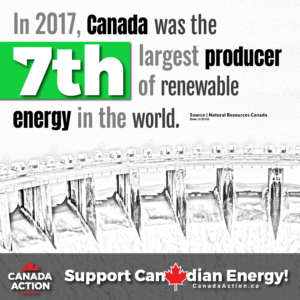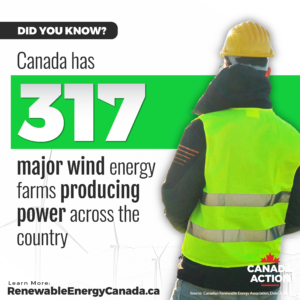Aiden Gonsalves – November 1, 2023
10 Sustainability-Related Post-Secondary Programs in Eastern Canada
More than half of Canadians – nearly 24 million people – live in eastern Canada. In addition to densely populated urban areas, the region is also home to millions of hectares of forests and some of the world’s largest lakes. As increasingly volatile weather patterns and the contamination of the Great Lakes indicate, climate change is of considerable concern for Canadians living east of Manitoba.
If you’re considering a program related to sustainability, consider eastern Canada. With programs specializing in everything from food security to marine biology, students have a wide array of post-secondary options to choose from.
These 10 sustainability-related programs in eastern Canada give students the education, skills, and practical experience they need to ensure a sustainable future at home and beyond.

Institution: University of Western Ontario
Location: London, ON
Type of Credential: Bachelor of Arts (BA) or Bachelor of Science (BSc)
Program Length: 4 years
Introduced in 2021, this program at Western is a great fit for students interested in how climate change affects society and vice versa. Through a mixture of geography, political science, biology, history, and anthropology courses, students are exposed to all facets of the climate crisis. Program graduates are poised to enter the workforce – or continue their academic journeys – with an informed, solution-focussed perspective on environmental issues.
Institution: Memorial University
Location: St. John’s, NL
Type of Credential: Bachelor of Science (BSc)
Program Length: 4 years
The Grand Banks, located southeast of Newfoundland, have been fished for centuries and are a world-renowned cod, haddock, and halibut hotspot. What better place is there to study marine biology than at the nearby Memorial University in St. John’s? This program exposes students to a wide variety of marine-related topics, including aquaculture, fisheries ecology, and marine animal diversity. Program graduates are positioned for careers doing everything from scuba diving to biological oceanography.
Institution: McGill University
Location: Montréal, QC
Type of Credential: Bachelor of Science (BSc)
Program Length: 4 years
A growing sustainability concern around the world is food security. With more than 8 million mouths to feed and a finite area of fertile land, the need for innovative, planet-friendly solutions to food insecurity is more pertinent than ever. This BSc program gives students a multi-faceted understanding of food insecurity issues around the world. Through classes spanning disciplines like agriculture, nutrition, environmental science, and international development, students will graduate with a working knowledge of food security issue areas and – hopefully – a passion for finding solutions. If that’s not enough, the program also offers hands-on experience through project work in Global South countries.
Forest Management and Environment
Institution: Université Laval
Location: Quebec City, QC
Type of Credential: Bachelor of Applied Science (BScA)
Program Length: 4 years
The only offering of its kind in Quebec, this program allows students to participate in the development, regeneration, and preservation of forests. Through a mix of in-person, distance, and field-based learning, students are exposed to business, social, and ecological aspects of forestry. The program offers solid employment prospects across Canada and emphasizes job openings for younger forestry engineers as much of the profession ages and retires.
Institution: Conestoga College
Location: Guelph, ON
Type of Credential: Ontario College Graduate Certificate
Program Length: 1 year
Cities are designed for people. This has been the case in Canada since the founding of settlements like Saint John, New Brunswick, and Montreal, Quebec, hundreds of years ago. However, with a growing need to slow the effects of climate change, modern city planning must also take the environment into account. This 12-month program gives students a baseline understanding of how to balance social, economic, and cultural considerations with environmental impact. Graduates are prepared for work in government, industry, and non-profit organizations.

Institution: University of New Brunswick
Location: Fredericton, NB
Type of Credential: Bachelor of Science (BSc)
Program Length: 4 years
There are a countless number of issues surrounding sustainability and climate change in Canada. From plastic in landfills to a declining warbler population to oil sector emissions, Canadians are facing a climate battle on every front. This Fredericton-based program puts solutions to sustainability issues at the forefront of its curriculum. Students can choose from 3 areas of specialization: People, Planet, and Planning, Water Resources Management, or Wildlife Conservation. Program graduates are poised to interpret and predict climate change with a view to providing innovative solutions in Canada and beyond.
Applied Nuclear Science and Radiation Safety
Institution: Algonquin College
Location: Pembroke, ON
Type of Credential: Ontario College Diploma
Program Length: 2 years
Nuclear energy is one of the worlds best options for consistent and low emitting power. This program is the only of its kind in Canada. Algonquin College gives students a theoretical and practical understanding of operations, protocols, and procedures associated with radiation and nuclear power. Graduates of the program are suited for work in a variety of fields, including nuclear power production, uranium mining, and the oil and gas industry. As an added perk, the program offers a paid co-op option for students to gain real-world experience in tandem with their education.
Environment, Sustainability, and Society
Institution: Dalhousie University
Location: Halifax, NS
Type of Credential: Multiple
Program Length: 4 years
The “ESS” program at Dalhousie is a great fit for students interested in the complex connection between humanity and the natural world. Students participate in this program in conjunction with another major as part of a Bachelor of Science (BSc), Bachelor of Arts (BA), Bachelor of Management (BMgmt), Bachelor of Community Design (BCD), or Bachelor of Journalism Honours (BJH) degree. The interdisciplinary nature of the program allows students to pursue research in a variety of areas. For example, a course called “Environmental Decision-Making” explores the challenges and considerations involved with making decisions that balance human needs and values with the environmental concerns.
Environment and Urban Sustainability
Institution: Toronto Metropolitan University
Location: Toronto, ON
Type of Credential: Bachelor of Arts (BA)
Program Length: 4 years
Located in Canada’s largest city, TMU is a better place than any to study sustainability in the urban context. Students of the Environment and Urban Sustainability program enjoy classes in an incredibly wide variety of topics. “Geography of the Physical Environment,” “Energy, Earth, and Ecosystems,” and “Ecological Processes in the Canadian Landscape” are just a few examples of required courses for the program.
Environmental Economics and Public Policy
Institution: University of Ottawa
Location: Ottawa, ON
Type of Credential: Bachelor of Arts (BA)
Program Length: 4 years
It’s estimated that, if left unchecked, climate change could cost the global economy nearly $250 trillion by 2070. That’s a lot of Krabby Patties. UOttawa’s Environmental Economics and Public Policy program gives students the research base and analytical framework to make sense of the ever-delicate balance between economic and environmental interests in Canada and beyond. In their fourth year, students have the opportunity to conduct a research project in the field to complement their in-class learning. The program is offered in English and French.
